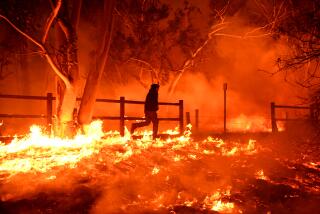Residents sue utilities, city of Ventura over damage caused by the Thomas fire

A group of Ventura County residents has filed suit, claiming Ventura utilities are responsible for damage caused by the Thomas fire.
- Share via
A group of Ventura County residents has filed suit against two utility companies and the city of Ventura, claiming they are responsible for damage caused by the Thomas fire.
The lawsuit, filed Friday in Ventura County Superior Court, alleges in part that Southern California Edison Co. crews working in the hills above the Ventura Ranch KOA Holiday campground in Santa Paula caused the fire.
The residents believe Southern California Edison’s “construction activities caused the ignition of dry vegetation at this construction site, which set off this massive wildfire,” according to court papers.
The official cause of the Thomas fire, which began in the foothills above Thomas Aquinas College on Dec. 4, has yet to be determined. The fire has destroyed more than 700 homes and contributed to the deaths of two people, including a firefighter.
On Wednesday, both the Ventura County Fire Department and the California Department of Forestry and Fire Protection said they were unaware of the residents’ accusations. They said the cause of the fire remains under investigation.
Southern California Edison declined to comment on the lawsuit.
In court papers, residents argue that Southern California Edison was negligent because the company either did construction “in an unsafe manner which ignited vegetation” or failed to maintain overhead electric and communications facilities.
Had the utility “acted responsibly, the Thomas Fire could have been prevented,” the complaint says.
Downed power lines have sparked massive California wildfires in the past, and utilities from San Diego to Northern California have been on the hook for millions of dollars.
After the 2007 Malibu Canyon fire, Southern California Edison ended up paying the state $37 million in fines.
Pacific Gas & Electric Co. has also faced blame. After Cal Fire investigators found the utility responsible for the 70,000-acre Butte fire that killed two people in 2015, the state attorney general sued the company for $87 million in related costs. That case, filed in April of this year, is ongoing.
The Ventura suit also argues that some hydrants operated by the city of Ventura and the Casitas Municipal Water District didn’t work properly because of power outages. That loss of power made it difficult for firefighters to save residents’ homes.
“Many of our clients are very angry and confused as to why in the height of a firestorm the fire hydrants lost power…. It was just like somebody shut the valve off,” said Alexander Robertson, an attorney representing the residents. “The firefighters had to send their engines where there was pressure, and it was a 20-minute round trip.”
Officials have said the loss of power caused by the fire and heavy winds left some water-pumping stations inoperable, so water couldn’t reach the fire hydrants.
It’s unclear how many hydrants lost water pressure, but water officials said elevated areas — including canyons and hillside neighborhoods hit hard by the fires — tended to suffer the most from the lack of water pressure.
Ron Merckling, public affairs resource manager for the Casitas Municipal Water District, said the utility “did not lose any hydrants” during the course of the fire.
“Our fire hydrants were working,” Merckling said. “However, there are certain mutual water agencies that we work with that may have lost pressure.”
The emergency operations center in Ventura began receiving reports of low water pressure from firefighters shortly after midnight Dec. 5, said Craig Jones, a spokesman for Ventura Water.
“The system in some areas was clearly overwhelmed by the magnitude and intensity of this fire,” he said. “We were without power for a long period of time. That adds an additional challenge.”
Ventura Water plans to put together a comprehensive engineering analysis and assessment about “what our system did and didn’t do,” he added.
By Wednesday morning, the Thomas fire had burned through 272,000 acres and was 60% contained. Officials do not anticipate full containment until Jan. 7, according to Cal Fire.
For more California news follow me on Twitter: @sarahparvini
More to Read
Sign up for Essential California
The most important California stories and recommendations in your inbox every morning.
You may occasionally receive promotional content from the Los Angeles Times.











